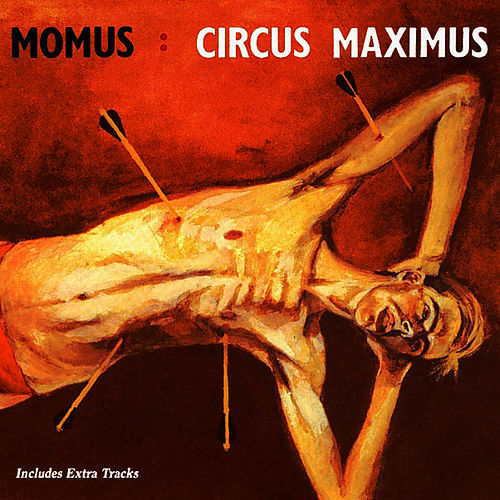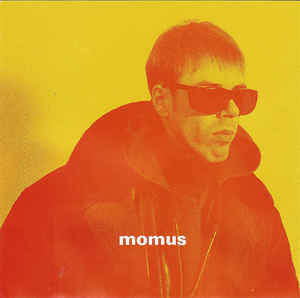Preferring the Ache.. #4 - Circus Maximus
- John Robinson
- Aug 15, 2019
- 8 min read
Updated: Sep 2, 2019
Again on Cherry Red imprint él, the first full album by Momus appeared in early 1986. As promised, it was a concept album based around the Old Testament. The musical style was retained from the previous EP, mainly based around acoustic guitar, synth and piano, and still very much in the mode of Brel and cabaret. The biblical stories concerned are, of course, about perversion and generally awful things happening. Where the album strays from the biblical theme i.e. the second half, problems emerge but there's a lot of interest here. The CD album and newer releases include an EP of Brel covers released shortly after, which will be discussed in the next post. But for now, into the Circus..

Lucky Like St. Sebastian: That's Sebastian there, on the cover, only it's Momus of course, in the role of the Christian martyr. This is a key track, the first on the first album, and it lays out the iconoclasm which will characterise this phase. The song is about Paul (from the New Testament of course, so we're off theme straight away). Paul feels guilty about the Christians he has killed, so requests a martyr's death like St. Sebastian, being told by a Senator of Rome that he can't have it because it will "give sado-masochism a bad name". Momus is talking here about the strange sexuality in images of the Christian martyrs, and the belief that such deaths were a blessing to the victims. Or it's about Frank Bough. The line about "whimpering with joy as Mr. Death receives his blue - eyed - boy" confirms the masochism and is a reference to the poem "Buffalo Bill's" by e e cummings, it's a line Momus will return to.
The second half of the song has Momus comparing himself to a Christian martyr because a waitress he fancies won't go out with him. His tortures in this regard are like being in Dante's Inferno, and the tragedy in this case is that "no-one's dying". It's utterly ridiculous, pompous and hugely over-reaches with its literary and religious allusions. It's also quite a charming song. Frankly, we've all been this version of Momus at some point when young, feeling that our romantic disasters are on a par with the tortures of Hell, and many have written pretentious poetry to that effect, whilst in some strange way enjoying the feelings of desperation that accompany it. Basically, yes Momus, I fucking hated school discos too.
The Lesson of Sodom (according to Lot): The Old Testament story of what happened after the destruction of Sodom and Gomorrah. Lot having been spared with his daughters (but not his wife, if you remember she was turned to a pillar of salt having looked back), they live in a cave. For some reason believing there are no other men remaining, the daughters "lay" with their father to repopulate the world. In the bible they do this without his full consent having got him drunk, whereas the song describes him as fully knowing what he is doing and "getting the best of both worlds in incest". There's a lot of word play here involving the "salt in your wounds" and how "you spoil the child if you spare the rod". By the end of the song Lot is no longer sure what the lesson of Sodom is, and the whole thing points out the ridiculous nature of some of these old bible stories. It's sung and played gently with synth washes and percussion - is that cowbell?!
John the Baptist Jones: With similar instrumentation, this tells the - again - New Testament story of the man who baptised Jesus, then enraged Herod's daughter and ended up beheaded and presented on a dinner platter.
"I was ahead" it starts, and that is by no means the last beheading based pun here.
John the Baptist is presented almost as if he is a conman "neck and neck with the kings of crime", who comes to grief when he meets Salomé. When she dances the dance of the seven veils we get the wonderful line "Salomé, there was only the crockery below me".
The ending moves into a more eerie melody, where he begs for a reprieve. This ending is so serious you wonder if the rest of it is supposed to be funny or not. Because it is.
King Solomon's Song and Mine: The story of slaves working in King Solomon's Mine. The narrator complains about the poverty he and his girlfriend Alison are living in whilst in the mine, which is understandable. This song could easily be a discussion of low pay and working conditions in general, aimed at greedy modern business: "You trade our daylight for Turkish delight, you trade our fear for euphoria". Solomon and his Queen take cocaine and have wild parties while his slaves argue unsuccessfully with the foreman. The narrator describes how his children, while going to school with the foreman's sons, will also end up working down the mine. This makes the song a distant, distant, distant cousin of "If you Tolerate this...". Distant.
Little Lord Obedience: One of my favourite of all Momus' songs, this plaintive song seems to talk about our ultimate obedience to the rules of existence, we must all procreate, grow old and die. It mingles this with the story of Jesus, who also obeyed God's commands to sacrifice himself. There is a sailor - who represents all men - who must obey when the gangplank lowers and the order comes to go, i.e. to die. He also obeys when in the "port in every girl" where he must procreate. It's all a bit gloomy and fatalistic really, the inevitability of life and death, but whereas "Christ found the source of the Bible" the sailor and his partner find "the source of the child", crediting humanity with a greater creativity than God in the ability to make new life: "No one comes without leaving someone else". The chorus is sung to the tune of Away in a Manger, with backing singers, and is quite lovely. You may agree or disagree with the philosophy on show here, or his description of all women as Amazons, but generally I can't find anything to snark at here.
The Day the Circus Came to Town: It was inevitable that a circus based song would appear at some point, by which I mean a song with oompahs and cabaret sounds. Momus describes a circus in Leith, where things go disastrously wrong. There are some specifically Scottish references, with Deacon Brodie sawing a corpse in two. There's also a dreadful incident at a wake:
"Last night's party met the day's first hearse And, spilling vodka on the wake made a fatal mistake With a match and flabbergasted watched them all Fall flambeed six feet underground"
Which now makes me shout "You let Dougal do a funeral!?"
I won't lie, I haven't got a clue what this is about in any detail. It certainly isn't in the Old Testament. It must be important though, because towards the end of the song Momus switches into a big band mode on the synthesizer and we get cymbals and arpeggiating strings all over the shop.
The Rape of Lucretia: There are times with Momus where you just have to throw your hands up and admit you're lost. We have a man called Tarquinius who has a problem down there for which he is consulting a Dr. Faust. The doctor tells him the story of Lucretia, who was a noble woman in the Roman Kingdom. She was raped by the King's son (was he called Tarquinius?) and the revenge for this led to the foundation of the Roman Republic. Incest is brought up again but I don't recall what that has to do with anything. Romulus and Remus are mentioned but were they around at the time? Is this a biblical story? The whole thing is very serious sounding, very po-faced. It's almost like a "hip" history teacher has come into the classroom with a guitar.
Anyway, I like the harpsichord sound that comes in around verse three.
Paper Wraps Rock: Oh Dear.
Yes, feeling lovelorn and melancholy can be a source of comfort in some way. But that sensation isn't the fault of the one you are lovelorn over.
This song talks about platonic love, and how never giving yourself to someone is the best way to remain desirable. Which comes across, no matter what the intent, as a petulant incel (as we would call them today) moaning about being in the friend zone.
"Never underestimate 'Never' And you'll live to love another day A woman never made a living By giving anything away"
The verses describe various ways in which women distance themselves from the ones who desire them, including this unfortunate stanza:
"Never underestimate the huntress The protected species of whore The chariot of Diana Regina's an enormous Limousine with bulletproof doors"
Which I will immediately draw a veil over.
And the whole thing draws to an execrable conclusion with a piano lesson underlining the petulance I mentioned:
"Every Good Boy, Every Good Boy Every Good Boy Deserves Favour, where's mine?"
The whole "Paper Wraps Rock" analogy was described by Momus at the time as representing the triumph of media imagery over reality, how the women on screens are not real at all, but representations, often created by men. The song just doesn't seem to follow that thought through. It comes across as bitter, misogynistic and quite unpleasant.
It isn't just me: Momus admits this himself on the next album, as we shall see.
Rules of the Game of Quoits: This is much nicer, a cheerful story of a sexual liaison in a gymnasium where a boy and girl are supposed to be playing quoits (I've no idea what that is), but end up doing something else instead. Whatever quoits is, it seems to involve wearing a tunic, using hoops and sticks. You have to thrust the quoit. Or not: that may be a euphemism.
There's still a tiny touch of what might be misogyny to note in the act itself, but this may be just a standard "sex as death" motif:
"The girl in the rubber shoes pins the ruddy-faced boy to the floor Of the gymnasium She's crawling on the spot, she's the ink-rubber, he's the blot And she erases him"
The album ends with a wash of synths and sound effects, a piano playing "There was an old lady.." presumably as a reference to the previous EP, and both Momus and a backing singer intoning: "For love will endure or not endure, regardless of where we are". (From the Threepenny Opera). The last note of which is clearly too low for Momus as you can hear his voice breaking.
So that is the first album over. At the time, and even listening to it now, it is extremely unusual in its approach to the singer-songwriter dynamic and has brave lyrical themes.
In my opinion, there are two great songs on here in Lucky Like St. Sebastian and Little Lord Obedience, the rest perhaps not so much. There are occasional attempts at a bigger, more wide screen sound as on The Day the Circus Came to Town and Quoits, which don't fully work owing to what I assume are budgetary limitations. The album garnered critical plaudits and was relatively successful for él. It also brought him to the attention of Creation records, which he would soon sign to.
Shortly after the release of Circus Maximus, a further EP was released on él Records, this time a set of three Jacques Brél covers, including the "Nicky" track that was the first I heard of Momus, and the subject of the next entry.






Comments